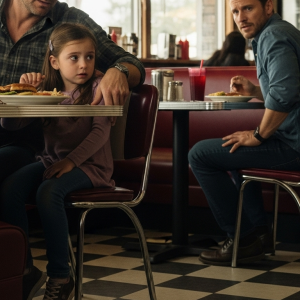My name is Eric, I’m 29, and until last year, I thought I understood what family meant. Not the Hallmark card version, but the real kind—the one you build your life around, even if it means carrying more than your share of the weight. I’ve always been the quiet one, the responsible son who sends flowers on birthdays and picks up the slack when nobody else even notices there is slack.
But I didn’t grow up thinking I’d be the backbone of a family that made me feel disposable. That part happened slowly, almost silently, like rot under the floorboards you don’t see until the whole thing caves in.
Growing up, I was the middle child. My older brother, Adam, was the golden boy—varsity football captain, effortlessly charming, always surrounded by a crowd. My younger sister, Mia, was the princess from the moment she was born. And me? I was the one who got B+ grades and was told I “wasn’t living up to my potential.” I didn’t mind, really. I kept my head down, got a scholarship, moved out, and eventually started my own small IT firm that, by some miracle, took off after three grueling years of ramen noodles and 16-hour days.
The funny thing is, when I was struggling, they were silent. But when the money came in, that’s when I became family again.
It started small. My dad asked if I could help cover the remainder of Adam’s car payments, “just until he gets that promotion.” Then came Mia’s private college tuition, because “the financial aid just didn’t cover enough.” My mom needed help with the roof repairs, then the heating system, then the kitchen remodel she’d always dreamed of. Just like that, I was paying for three households and still getting texts like, “Can you cover groceries this week?”
At first, I didn’t mind. I was grateful I could help. I convinced myself I was building something, a legacy maybe. But something about the way they treated it—like it was owed, like I wasn’t doing anything special—started eating at me.
Last Thanksgiving was the turning point. I hosted, not to show off, but because I finally had a home big enough for everyone. I had it catered. I set up a fire pit. Nobody offered to help, not even with the dishes. Halfway through dinner, Adam made a toast about how lucky we are to have each other, how family always comes through, never once mentioning the fact that I was paying for the entire event. Mia barely looked up from her new boyfriend. My dad spent the evening talking about how kids today have it easy.
I swallowed it all with a smile. But inside, I was already pulling away.
The night that unraveled everything was a random Tuesday, maybe two months later. I had just come home from a long meeting. My phone showed a missed call and a new voicemail from my dad. I pressed play, expecting a request for money or a complaint about the weather.
His voice was clipped, tired, and sharp. “All you do is take,” he said, his words slurring slightly. “You’ve never given this family anything worth remembering. If you had any pride, you’d stop acting like we owe you something and just leave.”
I stood there, stunned. I thought I must have misheard it, so I played it again.
All you do is take.
I didn’t yell. I didn’t call back. I just stared at the message notification for a long time. Then I walked over to the window and looked out at the city lights I used to love. Something inside me gave out, not with a bang, but with a quiet, clean snap, like an old hinge breaking under too much weight.
I packed a bag that night. No dramatic goodbye, no announcement. I sent a single, late-night email to my assistant: “Pause all recurring payments tied to family accounts, effective immediately.”
It was a clean, silent break.
Three days went by. Then a week. Radio silence. No one called. No one texted. It took them almost a full month to even notice.
Mia was the first. She called late one Friday night, her voice shaky. “Eric? Hey… I, uh, I just logged into the school portal, and my tuition didn’t go through this month. Did something happen with the account?” I could hear the panic she was trying to smother, that fake-casual tone you use when you’re trying not to sound desperate.
I replied with a single text message.
“Thought I never gave this family anything.”
No follow-up. No explanation. She didn’t respond, but within the hour, I had four missed calls from my mom and two from Adam. The final voicemail was from my dad, hilarious in a dark, twisted way.
“Eric, we need to talk. Whatever this little stunt is, it’s not funny. Your sister’s future is on the line.”
No apology. Just demands. Just that same old tone that said, “You owe us.”
That weekend, I flew to Denver. I’d never been, but I needed somewhere far enough away to feel like I’d escaped orbit. And back home, the foundation they had built on my silence finally cracked wide open.
I spent a week in Denver doing nothing. I walked to a little coffee shop every morning, journaled for a bit, then wandered around downtown, just to remind myself what uninterrupted silence felt like. No buzzing phone. No one asking, “Can you just do me one more favor?” It felt foreign, like I had to unlearn the habit of bracing for someone else’s disappointment.
By the second week, I’d rented a car and driven to Boulder. I hiked alone, something I’d always wanted to do but never got around to because someone always needed a bailout. I remembered a memory of Mia calling me from a resort in Cancun, saying she’d “lost” her wallet and needed emergency cash. That memory surfaced as I stood on a cliff trail, the wind cutting through my jacket. The entire valley stretched out below me. I laughed out loud, and the sound echoed off the rocks.
It took three full weeks before my mom broke the silence with an email. The subject line: “We need you to come home.” No greeting, just a long block of text that started with, “I don’t know what’s gotten into you,” and spiraled into, “Your father is furious,” and, “We’ve done so much for you,” before ending with, “Family doesn’t abandon family.”
I stared at it. Family doesn’t abandon family. Except they did. Every birthday they forgot. Every time they took money without a thank you. Every holiday where I sat in the background while Adam gave speeches and Mia was showered with gifts. They didn’t call it abandonment; they called it tradition.
I didn’t reply. Instead, I forwarded the email to my lawyer, Daniel. I told him to start the process of transferring the remaining funds from Mia’s educational account to a scholarship program for first-generation college students—the ones who actually needed help.
I also asked him to look into the deed for the lake house, the one my parents used every summer, paid off in full by me under the false promise that it would be a “shared family investment.” Turns out my name was still on the paperwork. So, I made a decision. I booked a flight back home. Not to reconcile. Not to feel guilty. But to collect what was mine.
I didn’t tell anyone I was coming. I landed around noon, picked up a rental, and drove straight to the house. The same house I helped renovate when Dad threatened to sell it unless someone paid for the water damage. I saw Adam’s old pickup in the driveway; I figured he’d moved back in after his car was repossessed. I used my spare key.
The moment I stepped inside, I heard voices from the living room.
“He’s being dramatic,” Adam was saying. “He’ll come crawling back once he gets over himself.”
Mia’s voice followed, quieter. “I just don’t get why he’s doing this. I mean, it’s not that much money to him, is it?”
Then, loud and clear, my dad’s grumble. “Eric’s always been the weakest one. Hiding behind his computer, acting like money makes him special.”
I stood there in the hallway, unseen, listening as they tore me apart, as if I wasn’t the reason the lights were still on. I didn’t cry. I didn’t storm in. I didn’t even feel anger. Just… confirmation. They never saw me. Not really.
I backed out quietly and drove to the lake house. I walked through the front door, looked at the wall of family photos that didn’t include a single one of me, and started snapping pictures for the real estate listing.
On Monday, I sent one final message to the family group chat.
“You said I never gave this family anything. So I’m finally giving you what you’ve always acted like you wanted: distance. No more tuition. No more car payments. No more roof repairs. Sell your own memories. I’m out.”
I left the group chat and blocked them all. I thought that would be the end. But I didn’t realize just how deep the web of dependence had gone, and how fast it would unravel once I cut every thread.
I was somewhere over the Pacific, on my way to Tokyo, when my phone finally caught up to the chaos. Dozens of missed calls. Voicemails from friends of Mia, trying to talk sense into me. Texts from my dad that unraveled from threats into desperate, half-finished sentences. “We didn’t mean it that way.” “You’re still our son.” That one made me laugh. I didn’t listen to a single voicemail.
Tokyo was everything I needed: clean, quiet, anonymous. For the first time in my life, I was just me, not someone’s backup plan, not the family fixer.
Two weeks into the trip, I unblocked one person: my cousin, Emma. She’d sent a single message: “When you’re ready to talk, I’m here. Not to convince you, just to listen.”
When I got back, we met at a cafe. She slid her laptop across the table. It was a Reddit thread. Mia, under a throwaway account, had posted a story about an “unexpected family emergency” and how she needed money to stay in school. She painted me as unstable, someone who’d abandoned them for no reason. People were donating. Strangers.
“She’s raised almost $6,000 so far,” Emma said, her lips tight. “I figured you should know.”
That night, I did something quieter than rage. I took screenshots of every payment I’d ever made for her education. I uploaded them to a private image album—no names, just dates and dollar amounts. Then, I posted one anonymous comment on her thread.
“Before you donate, maybe ask where the other $90,000 went. Some people forget who helped them the moment the help stops.”
Within 24 hours, her post was removed for suspicious activity. The comments had turned. It was the first real consequence any of them had ever faced.
The second came a week later, with a certified letter from my dad. It was a formal request for a meeting to discuss the “breakdown of our family dynamic” and their claim to “emotional equity” in the lake house. My lawyer, Daniel, just smirked. We sent them back a copy of the original agreement Dad had signed years ago, where he relinquished all future claims to the property.
That shut them up. But not for long. Not once word got out that I was selling the main house, too. Years ago, I’d loaned my parents a large sum to keep them from defaulting on their mortgage. They never paid me back. Daniel had tracked every wire transfer. We filed a lien on the house. They owed me over $80,000, which meant I could legally force a sale.
The day of the auction, I parked across the street and watched. It was surreal, seeing the home I grew up in, now with a small white sign on the lawn: NOTICE OF FORECLOSURE AUCTION.
My family arrived in my dad’s old Chevy. Mia’s face was blotchy. Adam was scowling. My parents looked ten years older.
“Eric,” my dad called out, his voice low and bristling. “You’re really doing this? You’re going to humiliate your own family over what? Some perceived slight?”
I looked him in the eye. “It’s not a slight,” I said calmly. “It’s a pattern. And it ends today.”
Mia joined them, her voice cracking. “I’m going to lose my scholarship because of this. Why are you doing this to us?”
“I paid for your first three years,” I said. “You never said thank you. Not once. Instead, you lied to strangers for money. And now you want sympathy?”
Her face crumpled. My mom finally spoke, her voice a fragile whisper. “Families don’t do this to each other.”
“No,” I said. “Families don’t take like this. You took everything. My time, my money, my trust. And when I stopped giving, you called me selfish.”
The auctioneer’s voice rang out, sharp and professional. My family stood there, rooted to the driveway, helpless for the first time in years. And I walked away.
The house sold within the hour.
A few months later, I got an email from Mia. “I don’t expect a response. I just wanted to say, I get it now. And I’m sorry.”
I read it twice, then archived it. Not out of spite, but because I no longer needed closure from them. I already had it from myself. And for the first time in my life, that was enough.




